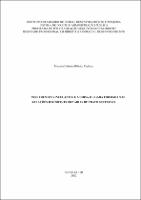Use este identificador para citar ou linkar para este item:
https://repositorio.idp.edu.br//handle/123456789/4310| Título: | Precedentes vinculantes e a coisa julgada formada nas relações jurídico-tributárias de trato sucessivo |
| Autor(es): | Cardozo, Marcela Holanda Ribeiro |
| Orientador(es): | Faria, Luiz Alberto Gurgel de |
| Palavras-chave: | Coisa julgada;Relações tributárias de trato sucessivo;Eficácia temporal;Recursos repetitivos |
| Data de submissão: | 2023 |
| Editor: | Instituto Brasileiro de Ensino, Desenvolvimento e Pesquisa |
| Citação: | CARDOZO, Marcela Holanda Ribeiro. Precedentes vinculantes e a coisa julgada formada nas relações jurídico-tributárias de trato sucessivo. 2023. 104 f. Dissertação (Mestrado em Direito) — Instituto Brasileiro de Ensino, Desenvolvimento e Pesquisa, Brasília, 2022. |
| Resumo: | O estudo que ora se apresenta terá como objeto tema que traz grande inquietação na doutrina
e na jurisprudência brasileira, qual seja, a relação entre o respeito ao instituto da coisa julgada,
nas suas dimensões subjetiva, objetiva e temporal, quando estiver em discussão as relações
jurídico-tributárias de trato continuado, na hipótese de posterior precedente do Supremo
Tribunal Federal (STF) ou do Superior Tribunal de Justiça (STJ), em sentido contrário ao
pronunciamento judicial acobertado pela coisa julgada. Para isso, será abordado o instituto da
coisa julgada, fazendo-se um paralelo do seu alcance nos diferentes tipos de relações jurídicas
(instantâneas, permanentes e sucessivas), dando ênfase às relações tributárias sucessivas.
Após, tendo em vista a função uniformizadora do ordenamento jurídico, será examinado o
papel da unidade e vinculação dos precedentes judiciais das Cortes Supremas (STF e STJ),
bem como a sua relevância e eficácia quando em jogo as relações jurídico-tributárias de trato
continuado. Na sequência, abordaremos o objeto do princípio da segurança jurídica, bem
como de outros preceitos constitucionais tributários e o da livre concorrência, essenciais ao
problema da pesquisa esboçada.. Em seguida, será feito um exame a respeito do julgamento
dos Temas ns. 881 e 885, em que o STF está a debater justamente os efeitos temporais da
coisa julgada nas relações tributárias de trato continuado na seara tributária, na perspectiva do
efeito normativo das decisões do STF proferidas em ações que tratam de constitucionalidade e
de inconstitucionalidade, tanto no controle difuso quanto no concentrado. Ao fim do estudo,
explicar-se-á o alcance da conclusão adotada no sentido de que o precedente firmado pelas
Cortes Supremas deverá ser aplicado de forma imediata e prospectiva para todas as relações
tributárias de caráter sucessivo, inclusive para os pronunciamentos judiciais acobertados pela
coisa julgada, não importando essa interpretação em desrespeito ao princípio da segurança
jurídica, já que o passado não sofrerá mudanças, tendo referidos precedentes aplicação pro
futuro , que respeitará, além do princípio da segurança jurídica, os princípios da isonomia e da
livre concorrência. |
| Abstract: | The study presented here will have as its object a theme that brings great concern in Brazilian doctrine and jurisprudence, that is, the relationship between respect for the institute of res judicata , in its subjective, objective and temporal dimensions, when the relationships are under discussion. legal-tax matters of continued treatment, in the event of a subsequent precedent of the Federal Supreme Court (STF) or the Superior Court of Justice (STJ), contrary to the judicial pronouncement covered by the res judicata. For this, the institute of res judicata will be approached, making a parallel of its reach in the different types of legal relationships (instant, permanent and successive), emphasizing the successive tax relationships. Afterwards, in view of the standardizing function of the legal system, the role of the unity and binding of the Supreme Courts' judicial precedents (STF and STJ) will be examined, as well as its relevance and effectiveness when the legal-tax relations of continued treatment are at stake. . Next, we will approach the object of the principle of legal certainty, as well as other tax constitutional precepts and that of free competition, essential to the problem of the outlined research. 881 and 885, in which the STF is debating precisely the temporal effects of res judicata in tax relations of continuous treatment in the tax area, in the perspective of the normative effect of STF decisions rendered in actions that deal with constitutionality and unconstitutionality, both in terms of diffuse and concentrated control. At the end of the study, the scope of the conclusion adopted will be explained in the sense that the precedent established by the Supreme Courts must be applied immediately and prospectively to all tax relationships of a successive nature, including judicial pronouncements covered by the thing judged, regardless of this interpretation in disregard of the principle of legal certainty, since the past will not undergo changes, with the aforementioned precedents being applied for the future, which will respect, in addition to the principle of legal certainty, the principles of isonomy and free competition. |
| URI: | https://repositorio.idp.edu.br//handle/123456789/4310 |
| Aparece nas coleções: | Mestrado Profissional em Direito Econômico e Desenvolvimento - Brasília |
Arquivos associados a este item:
| Arquivo | Descrição | Tamanho | Formato | |
|---|---|---|---|---|
| DISSERTACAO_Marcela Holanda Ribeiro Cardozo_MESTRADO DIR_2022.pdf | 1.05 MB | Adobe PDF |  Visualizar/Abrir |
Os itens no repositório estão protegidos por copyright, com todos os direitos reservados, salvo quando é indicado o contrário.
